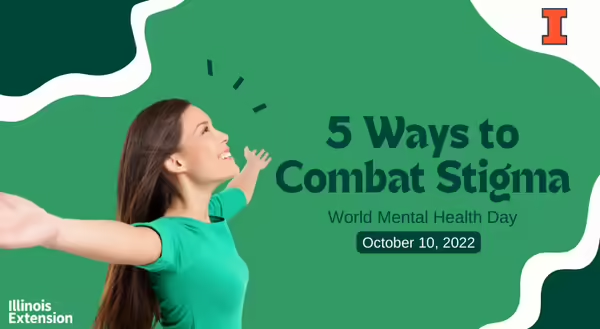
October 10 is World Mental Health Day! This day, first celebrated by the World Health Organization in 1992, is intended to raise awareness around mental health issues. It’s a great day to encourage everyone – in our communities, our workplaces, and our homes – to make mental health and well-being a priority. So how can you help?
Well, one of the biggest barriers to addressing mental health issues is stigma. Mental health stigma, or negative perceptions around mental health issues and those affected by them, can create lasting damage. This stigma can come from external sources, or it can be internalized as negative self-talk or personal beliefs. It can cause those affected to feel shame and loneliness, suffer from bullying and discrimination, and become less likely to seek or stick with treatment. Luckily, there easy ways that you and your family can take a stand against stigma:
Educate Yourself
Combat stigma by arming yourself with facts. The more you know about mental health issues, the less likely you are to buy in to untrue stereotypes and misinformation. And becoming well-informed doesn’t have to take a lot of time! Try reading up on one mental health disorder each day. The Health Topics provided by the National Institute of Mental Health offer a few paragraphs covering signs and symptoms, risk factors, and treatments.
You can even get your kids in on the action with some great children’s books about mental health.
Know the Numbers
Did you know that 20% of adults will face a mental health challenge this year? Or that HALF of all adults will be diagnosed with a mental health issue at some point in their lifetime? Mental health issues are everywhere. Understanding the prevalence of mental health issues can make folks affected feel less alone. Knowing that it’s not just you can be an important first step in combating self-stigma and internalized shame.
Want to see the stats? Try these:
- Mental Health by the Numbers, National Alliance on Mental Health
- Mental Health Disorder Statistics, Johns Hopkins Medicine
- Mental Health Information Statistics, National Institute of Mental Health
- Quick Facts and Statistics about Mental Health, Mental Health America
- Data and Statistics, Centers for Disease Control and Prevention
Share Your Story
If it feels safe and comfortable for you, sharing your stories about how mental health has impacted your life can be a powerful way to destigmatize issues. Sharing your struggles (or even your best-practices for self-care) can foster empathy, reduce shame, build solidarity, and be a tangible reminder of the prevalence of mental health challenges. And sharing doesn’t need a be a big reveal or long, heartfelt conversation (though it can be). It might be as simple as starting a sentence with “my counselor mentioned…” or describing a relaxation practice.
Watch Your Language
Have you ever heard a detail-oriented person describe themselves as OCD? Or someone who’s having a bad day describe themselves as depressed? Obsessive Compulsive Disorder (OCD) and depression can be serious, even life-threatening, issues. People who casually claim to be suffering from these challenges may, in fact, be doing just that. But they may also be using these diagnosable issues to flippantly explain quirky behavior. While this can seem harmless, it can also minimize the real struggles faced by people affected with these challenges.
To help combat stigma, it’s important to stop using these terms offhandedly. If you’re guilty of this (I know I have been!) you may start by training yourself to think and speak about mental health issues as medical issues. This is important because, well, they are medical issues – and when you equate mental health with physical health, you’ll be less likely to joke about it. (For instance, you don’t often hear glib comments about cancer or diabetes.) You may even want to make this an expectation in your home to help train your kiddos to be more aware of their language as well.
Speak Up
When you hear or see someone else perpetuating stigma, speak up! There’s no need for contention or arguments, but asking a polite question or offering some simple education in kindness can help others see the need for reduced stigma as well.
Find more info on mental health stigma at:
If you or someone you know is in crisis, contact the Suicide & Crisis Lifeline by dialing 988, or dial 911 in case of emergency.
MEET THE AUTHOR
Emily Schoenfelder joined the Illinois 4-H team in 2017. Prior to this, she began her work in positive youth development with California 4-H and the YMCA. She specializes in STEM engagement, social-emotional development, and educator professional development.
She received a Master of Science degree in recreation, park, and tourism administration from Western Illinois University.
When she is not writing curriculum or facilitating a training, you may find Emily sitting on the floor of her office, building marshmallow catapults out of popsicle sticks or designing mazes for robots for her next STEM program.
ABOUT THE BLOG
Connection Corner is a blog that provides timely information, activities, and resources to help you stay connected to loved ones, the world around you, and yourself.